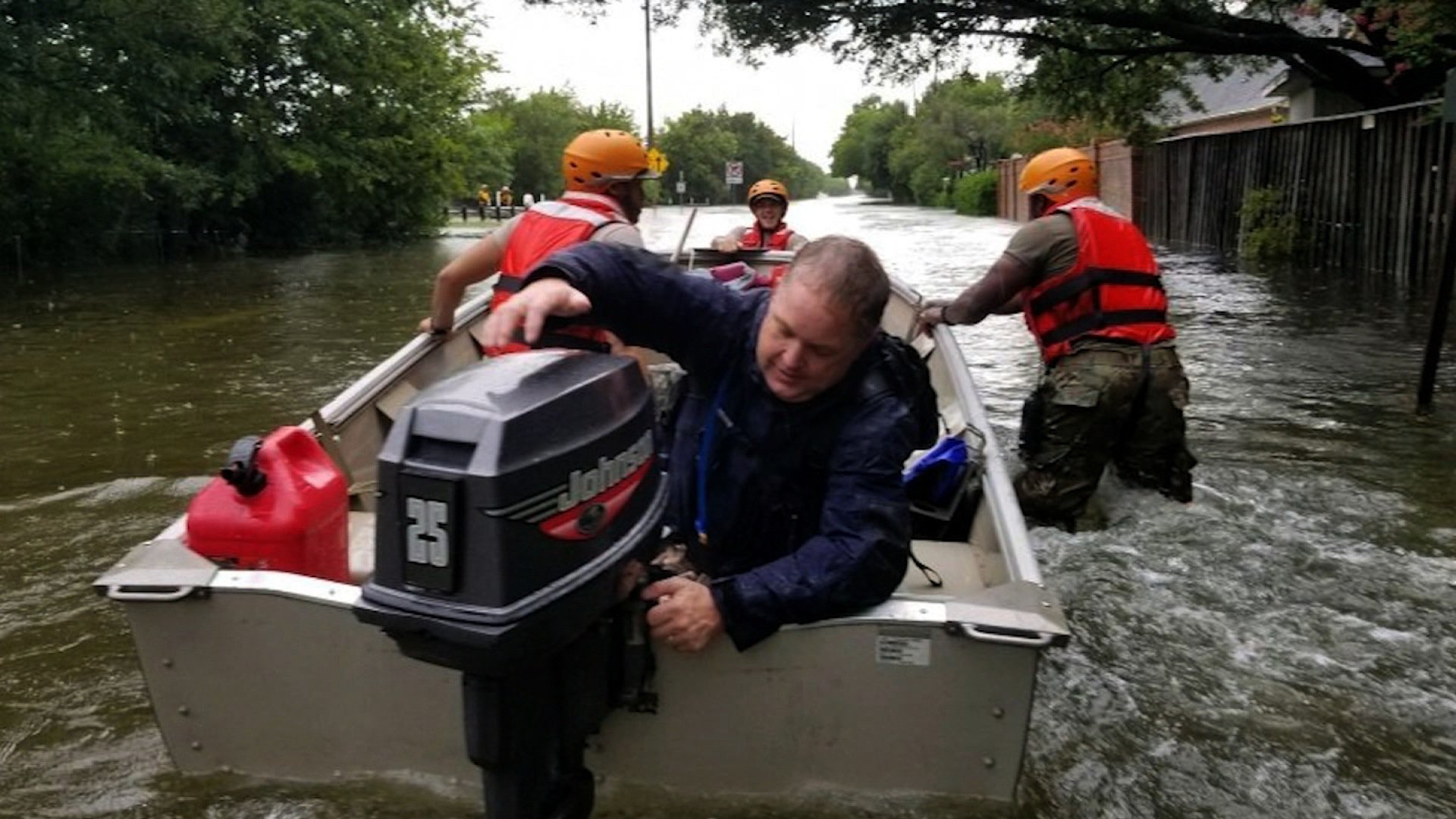In the thick of disaster, help doesn’t always come from a helicopter or a rescuer in a uniform. Sometimes, it’s a makeshift fleet of pickup trucks and jon boats, speeding toward danger as almost everyone else is trying to get out.
The Cajun Navy, the famous volunteer rescue group that formed in Louisiana after Hurricane Katrina, is mobilizing to Houston to deliver desperate residents from Harvey’s downpour. Clyde Cain, who runs the groups social media, told CNN they started deploying people in the early hours of Monday morning.
“There are hundreds of volunteers and we’ve already made hundreds of rescues,” he told CNN. “Our goal is to help people get out if they are trapped in their homes or apartments, get them to safety.”
As Katrina survivors and witnesses, these men and women know what it’s like to feel floodwaters rise around them with no guarantee of salvation.
In Houston, they now join locals and other out-of-towners who are patrolling waterlogged streets, opening their doors to strangers in need, offering their time and talents and choosing to help others instead of seeking higher ground.
Have boat, will rescue
Austin Seth doesn’t even live in Dickinson, Texas. The Lake Jackson resident traveled an hour with his boat to help rescue flood victims in the Houston suburb because he saw a call for help on Facebook.
When he spoke to CNN’s Ed Lavandera on Sunday, he said he already had rescued about a dozen people.
Over the weekend, public entities around Houston put out a call for volunteers with boats, and people like Seth were quick to respond.
Even those who escaped flooded areas were quick to man their own boats and head back to help.
With one hand on the large white boat he managed to bring with him from his flooded neighborhood, a Texas resident told CNN he was about to pick up eight people who had asked him for help on his way out.
After that, he said, he was going to do it all again and “save some more.”
Kindness on camera
In a situation as ever-changing as a storm, it isn’t uncommon for reporters to find themselves on the other side of the news.
On Sunday, while riding with Austin Seth, the boat rescuer, a CNN crew heard a cry for help. A woman and her elderly parents were steeling themselves to flee their flooded house. They had waited for the woman’s son, and for the Coast Guard, and no one had come.
Then, Seth and the CNN crew showed up. CNN’s Lavandera, producer Jason Morris and cameraman Joel De La Rosa assisted Seth in getting the couple, both in their 80s, out of the neighborhood to safety.
“We were about to leave the neighborhood, but we heard your voice,” Lavandera said.
The woman responded, “Yeah, well thank God.”
That same day, as KHOU news reporter Brandi Smith stood ready to describe the flooding on Beltway 8, she and her photographer Mario Sandoval spotted a dire situation below. A truck driver had gotten caught in his cab, and the high waters were keeping him from escaping.
The duo managed to flag down a rescue team, and the truck driver was pulled to safety.
Victims become heroes
Jim McIngvale owns two furniture and mattress stores in the Houston area. They sit on high ground, so even though his city is paralyzed McIngvale isn’t worried about flooding. In fact, he has opened up his stores to house anyone in need.
“We did this during Katrina and we had a couple hundred people staying for a couple days,” he told CNN. “We have tons of mattress in our warehouse and we can provide with a blanket. They sleep with mattress with plastic on it, and recliners, and wherever they wanted. We have a restaurant inside the stores and we are feeding them for free.”
In Rockland, Texas, some 250 residents have taken shelter in an elementary school. According to ABC News, the operation is manned mostly by young people who sleep in shifts and handle everything from leaks in the ceiling to making sure everyone in the building is comfortable and safe.
“At the end of the day, we’re family, you know, because it brings everyone together,” high school student Josh Campbell told ABC News.
So far, the group has not received any outside help. But like so many victims of Harvey’s flooding, they are making do with what they have — each other.



